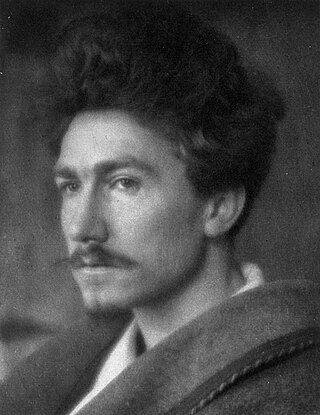
Imagism was a movement in early-20th-century Anglo-American poetry that favored precision of imagery and clear, sharp language. It is considered to be the first organized modernist literary movement in the English language. Imagism is sometimes viewed as "a succession of creative moments" rather than a continuous or sustained period of development. The French academic René Taupin remarked that "it is more accurate to consider Imagism not as a doctrine, nor even as a poetic school, but as the association of a few poets who were for a certain time in agreement on a small number of important principles".
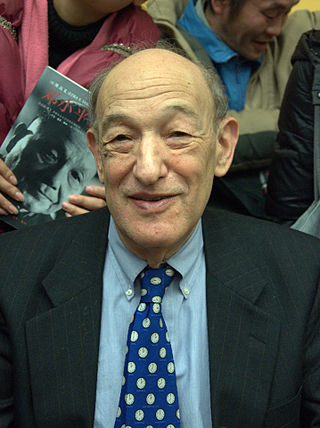
Ezra Feivel Vogel was an American sociologist who wrote prolifically on modern Japan, China, and Korea, and worked both in academia and the public sphere. He was Henry Ford II Professor of the Social Sciences at Harvard University.

Kenzaburō Ōe was a Japanese writer and a major figure in contemporary Japanese literature. His novels, short stories and essays, strongly influenced by French and American literature and literary theory, deal with political, social and philosophical issues, including nuclear weapons, nuclear power, social non-conformism, and existentialism. Ōe was awarded the 1994 Nobel Prize in Literature for creating "an imagined world, where life and myth condense to form a disconcerting picture of the human predicament today".
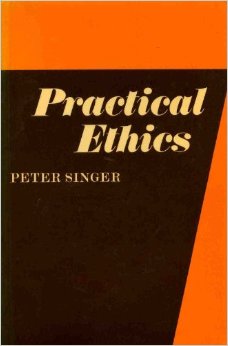
Practical Ethics, a 1979 book by the moral philosopher Peter Singer, is an introduction to applied ethics. The book has been translated into a number of languages.
Edmund Sears Morgan was an American historian and an eminent authority on early American history. He was the Sterling Professor of History at Yale University, where he taught from 1955 to 1986. He specialized in American colonial history, with some attention to English history. Thomas S. Kidd says he was noted for his incisive writing style, "simply one of the best academic prose stylists America has ever produced." He covered many topics, including Puritanism, political ideas, the American Revolution, slavery, historiography, family life, and numerous notables such as Benjamin Franklin.

Critical race theory (CRT) is a cross-disciplinary examination – by social and civil-rights scholars and activists – of how laws, social and political movements, and media shape, and are shaped by, social conceptions of race and ethnicity. Goals include challenging all mainstream and "alternative" views of racism and racial justice, including conservative, liberal, and progressive. The word critical in the name is an academic reference to critical thinking, critical theory, and scholarly criticism, rather than criticizing or blaming people.
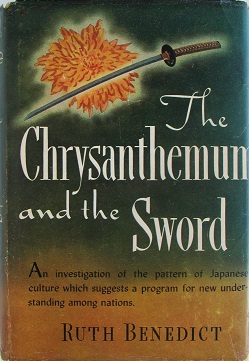
The Chrysanthemum and the Sword: Patterns of Japanese Culture is a 1946 study of Japan by American anthropologist Ruth Benedict compiled from her analyses of Japanese culture during World War II for the U.S. Office of War Information. Her analyses were requested in order to understand and predict the behavior of the Japanese during the war by reference to a series of contradictions in traditional culture. The book was influential in shaping American ideas about Japanese culture during the occupation of Japan, and popularized the distinction between guilt cultures and shame cultures.
Takeshi Amemiya is an economist specializing in econometrics and the economy of ancient Greece.
Akira Iriye is a historian of diplomatic history, international, and transnational history. He taught at University of Chicago and Harvard University until his retirement in 2005.
Joseph Richmond Levenson was a scholar of Chinese history and Jane K. Sather Professor of History at the University of California, Berkeley.

Barry Stroud was a Canadian philosopher and professor at the University of California, Berkeley. Known especially for his work on philosophical skepticism, he wrote about David Hume, Ludwig Wittgenstein, the metaphysics of color, and many other topics.
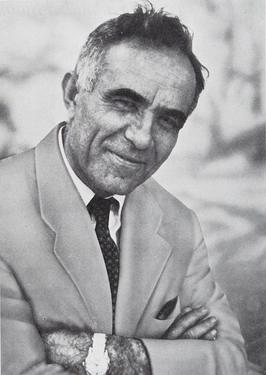
Wolf Isaac Ladejinsky was an American Georgist agricultural economist and researcher, serving first in the United States Department of Agriculture, then the Ford Foundation and later the World Bank. He was a key adviser on land reform to the governments of several Asian countries, including Japan from 1945 to 1954 as well as Mainland China and later Taiwan under Chiang Kai-shek, South Vietnam from 1955 to 1961 under Ngo Dinh Diem, and countries in Southeast Asia and the Indian subcontinent. His efforts in Japan and Taiwan were a striking success, but later efforts were frustrated. Improving the welfare of Asian farmers through agrarian reform was his goal throughout his long career, earning him praise as "no typical bureaucrat, but an impassioned reformer".
Marius Berthus Jansen was an American academic, historian, and Emeritus Professor of Japanese History at Princeton University.
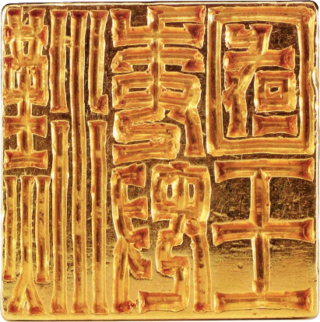
The history of China–Japan relations share a long history dating back thousands of years through trade, cultural exchanges, friendships, and conflicts. Japan has deep historical and cultural ties with China; cultural contacts throughout its history has strongly influenced the nation – including its writing system architecture, cuisine, culture, literature, religion, philosophy, and law.

John Curtis Perry also known as John Perry is an East Asian and Oceanic studies professor and historian. He is the Henry Willard Denison Professor Emeritus of History at the Fletcher School of Law and Diplomacy, Tufts University. He was also the director of that school's Maritime Studies program and founding president of the Institute for Global Maritime Studies, until his retirement in 2014.

The Spirit of Romance is a 1910 book of literary criticism by the poet Ezra Pound. It is based on lectures he delivered at the Regent Street Polytechnic in London between 1908 and 1909 and deals with a variety of European literatures. As with Pound's later, unfinished poem The Cantos, the book follows "a pattern, at once historical and atemporal, of cultural beginnings and rebeginnings".
Gary Cziko is an American researcher, and author in the field of educational psychology at the University of Illinois at Urbana–Champaign who has worked on the philosophical model known as perceptual control theory (PCT) – a model whose original developer, William T. Powers, was his mentor. He has written two introductory books on the subject, and in 1995 he introduced the concept of "universal selectionism" into the PCT model.
This article delineates the history of modernisation theory. Modernisation refers to a model of a progressive transition from a 'pre-modern' or 'traditional' to a 'modern' society. The theory particularly focuses on the internal factors of a country while assuming that, with assistance, "traditional" or 'pre-modern' countries can be brought to development in the same manner which more developed countries have. Modernisation theory attempts to identify the social variables that contribute to social progress and development of societies, and seeks to explain the process of social evolution. Modernisation theory is subject to criticism originating among socialists and free-market ideologies, world-systems theorists, globalisation theorists and dependency theorists among others. Modernisation theory not only stresses the process of change, but also the responses to that change. It also looks at internal dynamics while referring to social and cultural structures and the adaptation of new technologies.
Martin Luther Kilson Jr. was an American political scientist. He was the first black academic to be appointed a full professor at Harvard University, where he was later the Frank G. Thomson Professor of Government from 1988 until his retirement in 1999.
Liu Kwang-ching, who sometimes published under the name K.C. Liu, was a China-born American historian of China. He taught at University of California-Davis from 1963 until his retirement in 1993. He is best known for his scholarship in late-Qing history, astute bibliographical work, and edited volumes, including co-editing Cambridge History of China volumes.